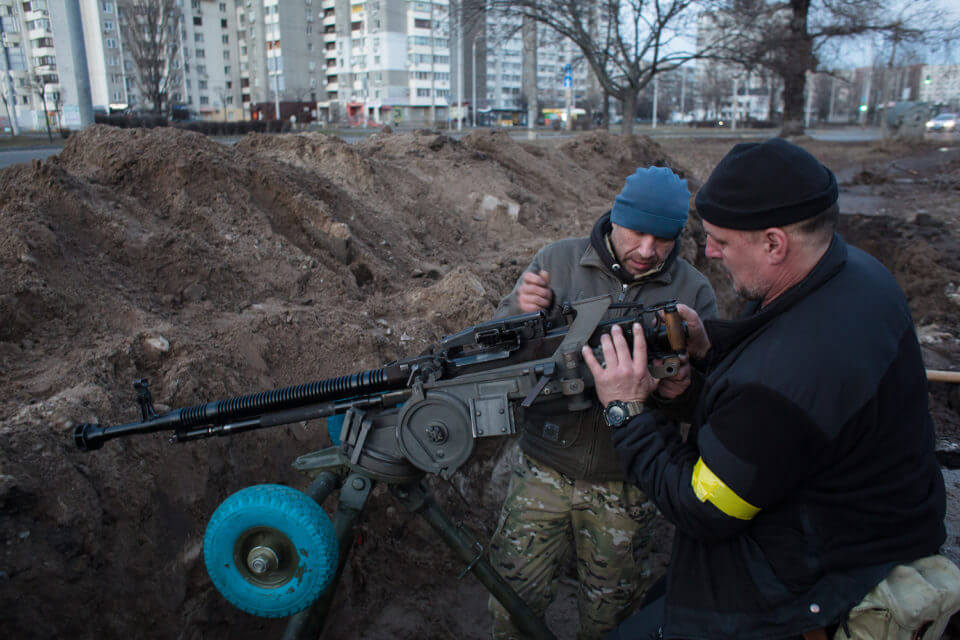
“Now, we face a second reminder of reality. First plague, now war has come to Europe, the biggest since 1945.”
In 2020, as the Coronavirus (COVID-19) pandemic was encircling the world in a suffocating grip that mirrored its physical effects on individual sufferers, I wrote that we, in the West, were waking up from our post-Cold War dream state to the reality of life that had always been there and which could no longer be denied. I was too apocalyptic in tone regarding COVID-19 itself: Back then it looked like it really would be a repeat of the 1918 flu pandemic, scaled up for a bigger, more intertwined global population.
But the fact remains that it was a rude awakening, only deadened by the fall back into digitally-enabled partisan conflict as a soporific. Now, we face a second reminder of reality. First plague, now war has come to Europe, the biggest since 1945. Vladimir Putin’s Russia invaded Ukraine on Thursday, February 24, 2022. What we thought was impossible was all too possible.
The situation in Ukraine is too fast moving to write usefully about here. Russia, having prepared since autumn 2021 and declared military operations abroad in the week of the invasion, invaded along multiple axes of attack on Thursday and is facing stiff opposition as of writing on Sunday, February 27th, with its advance stymied as of now. But the fact is it took the United States two weeks to reach Baghdad in 2003 and another week to take the city, and this was considered a lightning campaign in military terms. If it takes Russia a few weeks to take Ukraine’s capital, Kiev, that will still be one of the fastest campaigns in military history.
This is an entry point to the purpose of this essay: what this war says about the state of the West. Many in our societies are overly enthusiastic about the fact that Russia did not manage to take over a country, topple its leadership, install a new government, and defeat its combined armed forces in, at most, two days. As Sam Ashworth-Hayes and Sumantra Maitra have said, this speaks to the completely surreal time horizons in which people now operate. The laptop classes have become so used over the last decade to Amazon Prime delivery speeds and the wider instant digital economy that they cannot understand how long and how much effort it requires to move things around in the physical world, at scale, coordinating with others, while fighting a determined foe. Our Clerisy—the ideological legitimizers of the ruling class—has forgotten what conventional, peer-to-peer war actually is and what it means because it is less and less aware of the constraints of the physical world. Christopher Lasch was prescient when he wrote in the 1990s:
“The thinking classes are fatally removed from the physical side of life—hence their feeble attempt to compensate by embracing a strenuous regimen of gratuitous exercise. Their only relation to productive labor is that of consumers. They have no experience of making anything substantial or enduring. They live in a world of abstractions and images, a simulated world that consists of computerized models of reality—’hyperreality,’ as it has been called—as distinguished from the palpable, immediate, physical reality inhabited by ordinary men and women. Their belief in the ‘social construction of reality’—the central dogma of postmodernist thought—reflects the experience of living in an artificial environment from which everything that resists human control (unavoidably, everything familiar and reassuring as well) has been rigorously excluded. Control has become their obsession. In their drive to insulate themselves against risk and contingency—against the unpredictable hazards that afflict human life—the thinking classes have seceded not just from the common world around them but from reality itself.”
This secession from the world and reality itself is evidenced by the reaction to what the invasion represents. There have been so many takes along these lines that it is impossible to choose, but they can be summarized as “this is the 21st century, how can things like this happen now?!?” This attitude reveals both a naïveté about human nature and how that interacts with group competition, as well as an ignorance of history as revelation of human nature red in tooth and bladed claw.
The fact that we might have a human nature, universal in its creaturely essentials and particular in its social articulation, is anathema to many in our Clerisy and ruling class. This goes against their innate belief that the blank slate of the human person is receptive to any script they wish to inscribe. The faith that they can mould individuals and groups through environmental and therapeutic means toward a new, higher plane of morality, is the new form of belief in religious good works.
The fact that we are not blank slates and are largely defined by an intrinsic nature is one of the most uncomfortable and inadmissible truths there is. That this fact of our inborn nature, in all its fallenness, might play a role in deciding how both individuals and states interact with each other (meaning there are common themes throughout history against which it is unlikely we can stand for long) is too disturbing to contemplate. The Clerisy and ruling class fail “to understand the tragic character of human history,” as Reinhold Niebuhr put it back in 1960.
The belief that we are on an upward, progressive historical trajectory is emblematic of a latent Whiggish view of history that lies underneath so much of how we (and our elites, in particular) see the world. We, in the West, have just assumed that our post-Cold War peace and relative plenty was always here and would always be here, rather than the unreal blip in time it was. History’s long arc does not bend toward justice: Justice is delivered in the hereafter, not in this fallen world, and in the here-and-now there is only competition between adversaries, determined by power, for their own ends.
The Realist view of international relations is inherently tragic for this reason and does not view the relations between state actors as anything other than competitive and anarchic due to the impossibility of a global Leviathan to mediate between states and factions, as well as to enforce a social and security contract. Realism is fully aware of the risks of the ideological blindness, “which does not see the perennial difference between human actions and aspirations…the inevitable tragedy of human existence, the irreducible irrationality of human behavior, and the tortuous character of human history.”
Indeed, as I have written before, it is because of this that Samuel Huntington wrote that the neoliberal push for free-trade enabled globalism was driven by the erroneous conviction neoliberals had in the force for peace of commerce, which “was based on the highly dubious assumption that commercial interchange is invariably a force for peace. Such, however, is not the case. Economic growth creates political instability within countries and between countries, altering the balance of power among countries and regions. Economic exchange brings people into contact; it does not bring them into agreement.”
History with a capital-H does not end in the sense meant by Francis Fukuyama, or indeed in any sense. Interpreting Hegel through the lens of Alexandre Kojeve, Fukuyama saw History’s conclusion as something akin to a liberal democratic world state facilitated by commerce. The idea that we would all move inexorably to an liberal international system of governance can only be taken seriously by those disconnected from history and the conflictual, brutal truths about violent human nature it demonstrates. This is why Barak Ben Canaan says in Leon Uris’s novel Exodus that “International law…is that thing which the evil ignore and the righteous refuse to enforce.”
International law, the rules-based system, or whatever term favored this week by what Maitra calls the NGOcracy, does not exist absent the ability to enforce it. And the ability to enforce it is determined by power, which can be spent in useless foreign adventures and fruitless nation-building projects, as the West, led by America, has learned to its and Ukraine’s cost. To repeat the words of James Burnham, “Only power restrains power.” We forgot this, did not husband, or conserve ours and instead frittered it away. Now the bill has come due.
We are in no shape to pay this bill. Virtually our entire leadership class and its Clerical legitimators have for decades demonstrated a complete lack of seriousness about virtually anything. They are ignorant of history, geography, religion, nationalism, and ethnicity and how these influences interplay where foreign policy is concerned. As Australian foreign policy commentator Gray Connolly recently noted, “The fact that people don’t understand why people fight and die for things is just beyond me. I often get mocked on Twitter, oh you’re talking about history and religion. What do you think people die for? What do you think people pull triggers for? What do you think people put the bayonet [in], twist it and pull it out again for? That’s what people die for, for hearth and home, Horatius at the Gates, dying for the ashes of their fathers and the altars of their gods.”
This blinkered view of what motivates people is reflected in the temptation to call Putin mad. It shows that those who do so fail to grasp that he might see the world through a completely different lens than they do. As Giles Fraser writes, the spiritual dimension of politics is largely incomprehensible to our post-Christian elites but is seemingly important to Putin. Bernard Lewis made a similar point regarding our inability to see that Islamist terrorist really believed what they professed.
This divorce from the world and how people have always thought and acted within it (and continue to do so) speaks to a deep decadence only afforded by the illusion of our everlasting existential, national, and civilizational security. Conservatives often receive flak for their sometimes hyperbolic concern about the long march through our cultural, political, corporate, and even military institutions by a Successor Ideology that stands to undermine our common life and the security that ensures its continuation. The idea that America would see medical treatment decided by racial oppression points, inevitably at the expense of some peoples’ lives, was hardly present in even the fringe fever dreams of anti-PC conservatives five years ago, but here we now are in America in 2021/22.
This Successor Ideology of identitarian egalitarianism serves only to divide and weaken the institutions in which its relatively small number of adherents reside and the societies they serve. It is almost offensively simplistic to say that “Wokeness caused Putin to invade Ukraine.” However, it is fair to say that wokeness diminishes our cohesion and solidarity, thereby reducing our ability to act in a coordinated manner on the world stage. Malign actors like Putin are only too grateful for this opportunity, and they act to exploit it accordingly.
When British spy chiefs are apparently telling spies they should check their “white privilege” and avoid certain words like “strength” and “man power” that could be exclusionary; when the head of Britain’s MI6 is more concerned with communicating a form of gender politics than with doing his job in a time of war; and the Ministry of Defence spends its time disseminating its woke credentials via Twitter, then it is not “conservative culture-warrioring” to say that we are in trouble. Minority rights should be guaranteed, but that the communication of this takes such precedence during an emergency reveals at the very least, confused priorities, and, at worst, reveals an insincerity about the core function and reason for being of these organizations that is alarming.
If people are by nature willing to attack and defend, fight and die for God, country, family, tribe, and clan then this kind of decadent navel-gazing politics is representative of a society cut off from the forces of history and the realities of most of the world even since the end of the Cold War. We have deluded ourselves that we had moved on from the benighted past where things like loyalty, duty, courage, honor, heroism, strength, glory, and sacrifice were not only necessary but desired and considered virtuous characteristics of the individual and the culture and society as a whole.
In our “post-everything” world, our laptop class and the associated spheres of the administrative state, corporate oligarchy, and NGOcracy damn these virtues as evidence of inherent bigotry, hatred, and uneducated stupidity. The deep ties that bind, of mutual loyalty between those today, yesterday, and tomorrow, are seen as inherently constraining to the realization of individual and identitarian autonomy and, thus, must be dissolved in an increasingly liquid late modernity. The culture of repudiation that Roger Scruton diagnosed stands not only to undermine and dissolve the social bonds that make life worth living. It also leaves us exposed to threats in a rapidly geopolitically and environmentally destabilizing world.
Last year brought the plague; this year brought the war. We dreamed dreams of peace, everlasting economic growth, and moral improvement of the human condition, enabled by a historically unprecedented period of peace and plenty. The fact is that golden ages are the beginning of the end: Gold is the color of autumn, after all. The age of iron, of the winter of the world, began years ago, but we were numbed asleep by the narcotics of consumer capitalism and a digital, increasingly contactless society. Now, we must see whether we can awaken from our dream-state and learn to think and act in the world as it is, while hoping for better, even if it is in the life to come. We can only hope that we and our rulers attain the wisdom, prudence, and courage to do so. And if not, that we gain new leaders that have done so.
Henry George is a writer from the United Kingdom, focusing on politics, political philosophy, and culture. He has also written at Quillette, UnHerd, Arc Digital, The University Bookman, and Intercollegiate Review.










